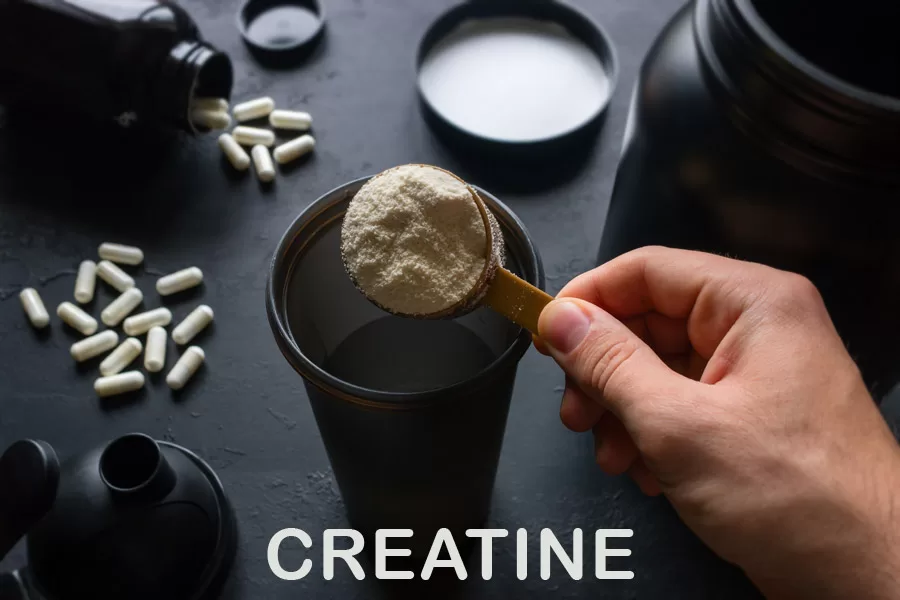On the modern market, numerous supplements are aimed at improving physical performance as well as appearance. For instance, creatine has been utilized by athletes for more than 30 years already and has proven itself efficient for growing muscles and gaining strength.
However, as happens with every supplement, one has to learn more about its action and recommendations for usage. In addition, there are some myths that should be dispelled to avoid misunderstanding. Here we are going to discuss creatine and weight gain starting from scratch.
What is Creatine?
This compound belongs to the group of non-essential amino acids. This means that our bodies get it from food and at the same time synthesize it inside. Therefore, the deficiency is rare in this case. However, vegans and vegetarians still have to be careful as this molecule is found mostly in meat and fish.
As for its internal creation, it is produced in different tissues including the brain, liver and kidneys, and is stored there. Still, the major part is located in the muscles.
This molecule performs two important tasks:
- Conversion of adenosine diphosphate into adenosine triphosphate (ATP), which is the main energy source for all cells.
- Increase of the dopamine level that is linked to proper motor functioning and mental health.
Among the compounds that influence our muscular system, this one is crucial. No wonder an idea to create a corresponding supplement appeared shortly after its discovery.
How creatine works
The main energetic currency in our bodies is ATP, which is utilized by each and every cell constantly. Especially, muscles that work hard require this molecule for better performance. The role of creatine in its production is as follows:
- This molecule can bind to phosphates with a formation of a phosphocreatine;
- It is utilized for ATP production from ADP;
- When energy is needed, the ATP is ruined with its release.
Therefore, without enough quantity of creatine, one will feel exhausted and it is impossible even to think about a good workout.
Different forms of creatine
In supplements, this molecule is included in different forms and chemical modifications, namely:
- Creatine monohydrate belongs to the most effective and common versions. You will find it as the most widespread component of the corresponding supplements. In addition, scientific investigations have proven its efficiency;
- Itsethyl esterwas made to increase the absorption of this molecule. However, there is no evidence of the growth in efficiency for it;
- Its hydrochloride is characterized by higher solubility so its daily dosage can be less;
- Buffered creatine is combined with an alkaline solution to avoid the most common side effect, namely water retention;
- Liquid creatine has a ready-to-drink formula that is just more convenient for consumption but is not related to higher efficiency;
- Its complex with magnesium provides in addition to the basic molecule a metal atom that is also useful for muscles.
Despite these different varieties, there is no evidence of a better performance of some of them compared to the classical monohydrate. Still, their effects are comparable so each will give you the desired result.
Why Do People Take Creatine?
Not only professional athletes but also ordinary people who visit the gym regularly are interested in this compound. The most popular reasons for the utilization of this supplement include:
- Improving performance during workouts, the strength of muscles, and increasing fat-free body weight.
- Speeding up muscle recovery after workouts and proceeding with more hours of training.
- Getting enough creatine storage in the body, especially for people who follow a vegetarian diet.
As all these effects are proven, there is a logic in the usage of such supplements together with the proper diet and regular workouts.
Creatine and Weight Gain
One of the main concerns related to this compound intake is the data about weight gain in case of its consumption. There is an opinion that this consequence will follow. However, one should understand that there is no way to gain fat and there is another mechanism involved.
Does creatine cause weight gain?
The key point of this molecule’s action is increasing lean muscle mass. However, this process occurs gradually and after a long period of regular intake, one will observe this effect and a corresponding weight gain. Still, it is not going to be extreme.
How creatine can impact weight gain
In addition, we should mention the property of this molecule to retain water in the body, namely inside the muscles. Its osmotic properties can lead to temporary swelling. However, hyper-hydrate muscles also use water as an energy resource.
This swelling is the process that is often confused with weight gain. However, it never lasts more than two weeks during which the so-called creatine loading occurs. Through this period, it is important to decrease the level of sodium in the diet and to drink more water for proper excretion. Then, the swelling will naturally subside and then one will observe only muscle growth.
As for fat formation and storage, this molecule does not take part in any related metabolic process. Thus, there is no need to worry about creatine making me fat.
Benefits of Creatine
Let’s summarize the useful effects of this compound that serve as the reasons for its popularity.
Improved athletic performance
Those, who regularly visit the gym, observe the following:
- Boost in energy levels.Creatine is directly involved in energy production in the body. Thus, the higher its level is, the easier is for the body to produce and consume energy in the form of ATP;
- Higher performance during the workouts. Power and strength are coming together in the case of its consumption. Moreover, both muscles and the brain perform better that improves overall condition.
Increased muscle mass
Those, who are craving to have an athletic appearance, enjoy:
- Faster muscle mass growth.It is used for the synthesis of proteins and the development of novel fibers that are needed for the mass increase;
- Better functioning of muscles that can not only work harder but are also restored more swiftly.
Other health benefits
Additional health benefits include:
- Alleviation of Parkinson’s disease symptoms;
- Improvement of such neurological conditions as epilepsy, Alzheimer’s disease, brain injury, or ischemic stroke;
- Better brain functioning;
- Lowering of blood sugar levels that may be useful in case of diabetes;
- Mitigation of physical and mental fatigue.
As this compound belongs to the natural molecules in our metabolism, there is a small wonder it has so many useful effects. Moreover, we can profit from them using special supplements.
Side Effects of Creatine
In general, this compound is safe to use for healthy people who follow the recommendations on its intake. However, sometimes customers experience side effects such as:
- dehydration and cramps of muscles;
- digestive issues like nausea and diarrhea;
- different kidney issues.
Furthermore, those who have any heart, liver, or kidney issues must consult a specialist before starting to take it.
It is also important to follow your overall conditions after the beginning of its usage and immediately stop in case of any obvious side effects.
How to Use Creatine
Those who wish to get the most efficiency out of this supplement should follow advice on its intake. This includes the recommended dosage together with the timing and several additional useful tips. When one can concisely and follow these easy rules, then the result will be amazing.
Dosage
Under normal conditions, our bodies produce approximately 1 gram of creatine every day. Some amount we receive with food and counts to up to 3 grams per day on the basic needs.
As for the supplement, it is recommended to saturate your muscles first and then continue with a daily dosage of up to 5 grams. For saturation, one needs daily the amount that is calculated by multiplying 0.3 by one’s weight. It is consumed during the day. The course lasts several weeks with an intake of a supplement for five days out of the week.
Still, it is better to consult the specialist to select the dosage according to one’s health condition, aims and set of training.
Timing
The best time for this compound intake is immediately before the workout. In this case, the major part will be utilized immediately and increase the performance and the minor part will proceed to storage.
Tips for safe use
To experience all the prosperous effects of this molecule without any problems, follow the next advice:
- Remember about hydration and drink 3-4 liters of pure water every day;
- Include cardio training in your workouts;
- Follow a healthy diet with decreased levels of salt and sugar;
- Increase intake of proteins;
- Be moderate in caffeine-containing drinks.
These rules are quite simple to follow and this will guarantee that you obtain the desired result due to this supplement.
Summary
In a nutshell, creatine is a powerful and energy-boosting compound that our bodies need every day. Without its proper amount, there is no way to gain muscles and keep their strength. While we get in from food and the body itself synthesizes it, it may be not enough.
Therefore, one can concisely include it into a routine as a supplement. Just it is worth keeping in mind tips for its safe utilization and, of course, continuing regular workouts and a healthy diet.
FAQ
Does Creatine Make You Fat?
There is such a myth. However, this does not ever happen in reality. During the first period of consumption, the compound may lead to the retention of water in the body. Still, there is no possibility to gain fatty cells due to it.
Does creatine make you gain belly fat?
No, there is no scientific evidence on this issue. On the contrary, fats will be better burned during workouts due to the intake of this compound.
Does creatine make you gain weight if you don’t workout?
This compound is aimed at increasing the amount of muscles. However, it does not provide us with more weight, especially in the form of fat.
How much weight can you gain from creatine in a month?
If combining its intake with workouts and a healthy diet, one can gain up to 3 pounds in muscular weight during this period.
Is creatine weight gain permanent?
If we talk about initial water retention, it will disappear in a few weeks. However, muscles that grow will be in place if you continue to exercise regularly.
Does creatine make you stronger?
Yes, there is scientific evidence of such influence. Due to this compound, muscles not only grow quickly but are also restored faster and gain enough strength to satisfy all your needs.
Does creatine make you gain weight in your face?
Some changes in appearance are possible due to the retention of liquid during the first weeks of intake. However, this effect disappears shortly and then no changes in the face are observed.







